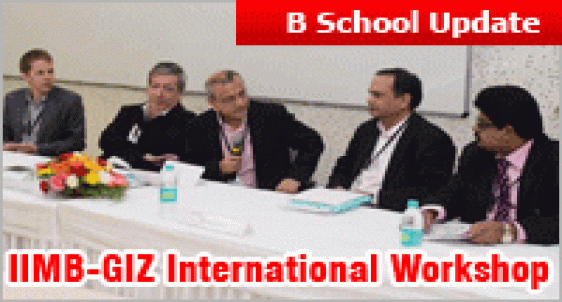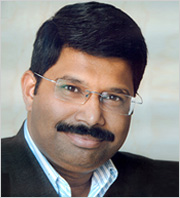
Discussing the concept of sustainable and inclusive cities, analyzing strategies for sustainability, sharing global experiences and listing local challenges with perspectives from municipalities and city corporations, the one-day IIMB-GIZ International Workshop on ‘Inclusive Sustainable Cities’, hosted at IIM Bangalore on Sunday April 12, 2015 had plenty of examples drawn from the field, including Mandur, the controversial landfill on the outskirts of Bangalore.
Observing that while cities in India had a plethora of plans, they singularly lacked vision and had failed to take into account ground realities such as slums and poverty, S K Joshi, Principal Secretary, Telangana state, said “Many of our Acts and regulations are antiquated; we should rewrite them. What we need are modern laws and collaborative individuals who can work with the system. Only then can we build sustainable cities”
Experts at the International Conference on ‘Inclusive Sustainable Cities’, hosted by IIM Bangalore advise city planners to steer clear of romantic hype and focus on ground reality and governance. The views were expressed that ‘India’s cities have a plethora of plans but little vision or value’. Wondering why peripheral villages, towns or the outskirts should be treated as dumps of main cities, A. Damodaran, Workshop Chair and MHRD Chair Professor of IP Management at IIMB, said: “Why can’t the main city handle its own dirt? That’s because planning agencies seldom take real-life challenges into account.”
Prakash Javadekar, Union Minister for Environment, Forests and Climate Change, who joined the conference on video from New Delhi, said: “This is not about making our cities smarter in terms of posh buildings and malls but about sustainable living.” Citing the example of Paryavaran Bhawan, the headquarters of his ministry in New Delhi, Javadekar said he hoped to see more people and businesses adoption green technology. Lauding Prime Minister Modi for acting on the mission of creating sustainable cities, he said institutions like IIM Bangalore and GIZ should take the lead in providing research insights into the challenges of creating inclusive cities.
In his opening remarks, Sushil Vachani, Director, IIM Bangalore, said: “I know I am preaching to the pious – you are all aware of the effects of climate change. In recent years, there is a better balance in the discourse on how to mitigate the effects of climate change and how to adapt. However, there is a need to develop and scale innovative solutions while tackling challenges be it climate change, migration or poverty.”
Drawing from his experience while co-editing a book on adaptation to climate change, Dr. Vachani said, “While I was heartened by the progress made by many countries, I was also struck by the amount of the work that needs to be done.” South Korea, he explained, stood out for its use of technology in warning of potential disasters such as floods.
Singapore, he said, has made great strides in planning to tackle urban flash floods and devising ways to conserve water. “All these countries are involving civil society in addressing inclusiveness. Hong Kong too learnt from its unfortunate experience with swine flu and has developed coordination between its numerous agencies. China has developed strategies that other countries can learn from. Innovative scalable solutions are the key to create a more inclusive society,” he emphasized.
Dr. Dieter Mutz, Head, Energy Operations, GIZ, touched upon factors like security safety, healthcare, education and employment opportunities, and technology but added that the idea of a smart city continued to be tinged with romanticism. “We should steer clear of romanticism and stick with hard facts when we talk of inclusive cities,” he advised.
The workshop surveyed ongoing research on sustainability and inclusivity in the context of the cities in developed and emerging countries. The workshop also sought to provide cross-continental perspectives in managing natural resources.
While recognizing the limitations of a standard model of sustainable development for cities in different parts of the world, the workshop, that had 4 main sessions including one on governing and financing low-carbon cities, looked at broad policy interventions that could render cities in developed and emerging economies inclusive and low carbon based.
Academics from India, Germany, and USA presented their work. Policy makers such as S K Joshi, Principal Secretary, Telangana state and N Baijendra Kumar, Additional Chief Secretary, Chhatisgarh and Chairman of ‘Naya Raipur’, shared their experiences on ‘Sustainable Urban Planning for Cities in New States’.
Offering a history of Germany’s buildings energy consumption, Harry Lehmann, Head of Division, Federal Environment Agency, Germany, gave examples of initiatives such as solar architecture towards creating low carbon cities. “The stakeholders in building low carbon cities in Germany are regional administrators of 16 German cities, federal authorities and municipalities. The real work happens in the municipalities but the trickle-down effect of good laws and codes is invaluable,” he pointed out.
Jan Beermann, Environmental Policy Research Centre, Germany, spoke of the collaboration between Pune and Bremen, where NGOs from the two cities collaborated and set up DEWATS (decentralized waste water treatment system) plants. “Sadly, the project failed to make impact as it got bogged down by lack of political will.” On the other hand, the Nashik-Hamburg ‘waste to energy’ project, which is currently in the implementation stage, he said, stood out as an example of effective collaboration and citizen participation. “For their large-scale impact, partnerships of this sort depend on legal frameworks and state support,” he added.
IIM Bangalore
A 100-acre oasis in south Bangalore, the Indian Institute of Management Bangalore (IIMB), with its all-stone architecture, lush verdant woods and landscaped gardens, provides an idyllic environment to engage in management studies, academics and learning. IIMB has world-class infrastructure that facilitates excellence in teaching, research, consulting and other professional activities. IIMB is one of the few campuses to use the Moodle learning management system, which acts as an interface between the students and the faculty.
IIMB is a Wi-Fi enabled campus. The Computer Centre is available for use round the clock. Printer facility is provided at the Computer Centre as well as in the hostel blocks. High speed Internet, highly resourceful intranet, sharing software, and internal messenger make all work easy and quick.
IIM Bangalore is EQUIS accredited B school. The accreditation is an indication that recognized institutions satisfy international standards. It is the first B-School in Asia to sign an agreement with Harvard Business Publishing (HBP) to distribute faculty teaching cases.
GIZ
GmbH (German Federal Enterprise for International Cooperation) or GIZ is an international enterprise owned by the German Federal Government, operating in many fields across more than 130 countries. It primarily works with states, state agencies, and the private sector. Its headquarters are located in Bonn and Eschborn, Germany. The organisation was established on 1 January 2011 through a merger of the three German organisations Deutscher Entwicklungsdienst (DED), Deutsche Gesellschaft für Technische Zusammenarbeit (GTZ), and Internationale Weiterbildung und Entwicklung (InWEnt).
GIZ has been operating in India for 60 years. Currently more than 300 staff members, including 25 seconded personnel and 10 integrated experts are handling sustainable development measures worth about 50 million euros per annum. GIZ supports its Indian partners in achieving sustainable and inclusive growth.
Stay tuned to MBAUniverse.com for more updates on IIMB



























